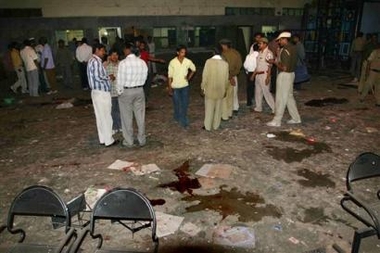|
Coordinated bombings kill 15 in India
(AP)
Updated: 2006-03-08 08:54
A series of coordinated bombings rocked a packed railway station and crowded
temple Tuesday in Hinduism's holiest city, killing at least 15 people and
injuring dozens in an attack that raised fears of communal violence.

People and
policemen stand at the site of a bomb blast at the railway station in
Varanasi, India, Tuesday, March 7, 2006. Explosions rocked a packed
railway station and crowded Hindu temple Tuesday in Hinduism's holiest
city, and at least 12 people were killed and dozens injured, officials
said. [AP] |
Cities across India were put on
high alert as Indian Prime Minister Manmohan Singh appealed for calm, said his
spokesman, Sanjaya Baru.
"Stern action will be initiated against all those found involved," said
Mulayam Singh Yadav, the chief minister of Uttar Pradesh, the state where
Tuesday's blasts occurred.
The attacks, which injured at least 62 people, came only days after Hindus
and Muslims fought in the streets of Lucknow, leaving four people dead, during a
visit to India by President Bush. The next day, angry Hindus looted Muslim shops
and burned vehicles in the coastal resort of Goa in a dispute over a mosque
demolition.
It was unclear whether Tuesday's bombings were the work of anti-government or
anti-Hindu militant groups or were connected to Bush's visit.
At least 10 people died in what appeared to be two bombings at Varanasi's
train station, and five others were killed in another blast at the temple on the
banks of the holy Ganges River, said Alok Sinha, a senior state official.
However, since the bodies were counted at the mortuary, he could not be sure how
many died in each place.
Another senior official, Kamlesh Pathak, said two unexploded bombs 锟斤拷 one
hidden in a pressure cooker and the other in a backpack 锟斤拷 were found at
Varanasi's Godowalia Market and defused by police.
The Press Trust of India news agency, meanwhile, reported that security
officials found four unexploded bombs at a bathing platform on the banks of the
Ganges, a few miles away.
The blast at the Sankat Mochan temple went off near dusk, when the shrine was
crowded with Hindus making special Tuesday offerings to the monkey-god Hanuman,
said police inspector Madan Mohan Pande.
At least 22 people were wounded in the temple blast, police official Mohammed
Hashmi said.
Televised footage showed a man, his face bloodied, lying on a stretcher. An
old woman lay on the floor, holding up her arms to helpers, who pulled her away.
Debris, body parts and blood covered the temple floor.
Most witness accounts of the blasts at the city's crowded railway station
said one bomb went off either in or next to a train car and the other near the
ticket counter in the waiting room.
At least 40 people were injured there, 22 of them seriously, Pathak said.
One witness, Sunil Yadav, described a scene of confusion, with people running
and screaming.
"It was a high-intensity blast," a man identified only as Pradeep told the
CNN-IBN television station. "After the blast people were running like anything."
Varanasi, 450 miles east of Delhi, is Hinduism's holiest city and ordinarily
is filled with pilgrims visiting temples and bathing in the holy waters of the
Ganges, which runs through the city.
It also is a popular spot with foreign tourists, especially backpackers.
Home Secretary V.K. Duggal said Tuesday's blasts were similar to Oct. 29
bombings in New Delhi that killed 60 people.
Like those blasts, blamed on Islamic militants fighting to wrest
predominantly Muslim Kashmir from India, the Varanasi explosions occurred within
10 minutes of each other, Duggal said, according to the Press Trust of India
news agency.
While Varanasi is a largely Hindu city, it also has a sizable Muslim
population.
Police and paramilitary troops fanned out in Varanasi after Tuesday's
explosions, and political leaders, among them top officials for the Hindu
nationalist opposition, headed for the city.
The attack on the Hindu holy city came days after Muslims and Hindus battled
each other in two other Indian cities, raising fears of a repeat of Hindu-Muslim
violence that rocked western India in 2002 after 60 Hindus pilgrims were killed
in a train fire initially blamed on Muslims.
That rioting left more than 1,000 people dead over three months. Human rights
groups say it was encouraged 锟斤拷 and at times outrightly directed 锟斤拷 by
politicians.
Although officials have not yet said who they believed was behind Tuesday's
attack, many in India clearly suspected Muslim extremists.
On Friday, there were clashes in the nearby city of Lucknow after Hindu shop
owners refused to respect a general strike called by Muslim leaders to protest
Bush's visit to India. Four people were killed.
On Saturday, hundreds of Hindus rampaged through a town in coastal Goa,
storming a police station, beating officers, looting Muslim shops and burning
vehicles and buildings. The violence came after Muslims demonstrated to protest
the demolition of a mosque by suspected Hindu extremists.
|